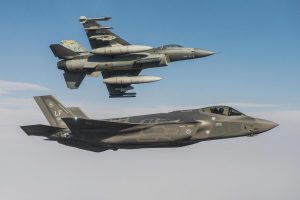The U.S.-Turkey F-16 deal has broken a diplomatic stalemate, paving the way for Sweden’s accession to NATO.
In the aftermath of this diplomatic breakthrough, an anticipated sense of optimism pervades the Alliance.
However, the strategic implications of this military transaction go beyond the immediate delivery of aircraft, serving as a litmus test for the future of the U.S.-Turkish partnership.
Questions persist about whether this deal signifies a genuine reset in their relationship or merely reflects a temporary alignment of interests.

Nick Danforth is a Senior Visiting Fellow for the German Marshall Fund focusing on U.S.-Turkish relations.
In an interview with “To Vima Newspaper,” Nick Danforth, an analyst specializing in Turkey, U.S. foreign policy, and the Middle East at the Wilson Center, dismisses the notion that the recent F-16 acquisition heralds a true reset in the strained U.S.-Turkish bilateral relationship.
As he articulates the deep-seated strategic and ideological differences between the two nations, particularly under Erdogan’s leadership, make the prospect of a return to a strong NATO alliance increasingly improbable.
Mr. Danforth delves into the challenges and implications of a transactional relationship, highlighting the delicate balance in future arms sales negotiations and the potential leverage the United States may exercise in response to Turkey’s behavior in the Eastern Mediterranean.
Does the F-16 acquisition offer a genuine opportunity to reset the bilateral relationship between the United States and Turkey?
No. I think it is too late for resets in the U.S.-Turkish bilateral relationship. It is good news from the U.S.-Turkish perspective. It is better than the alternative. It is clearly a positive development that one way or another, Sweden got into NATO. Let me put it this way. It doesn’t signal a reset in the relationship. At best, it suggests that the two countries can still have an occasionally effective transactional relationship. They can work together when they both have pressing interests at stake.
Why do you assert that it is too late for resets in the relationship? Is there a plausible chance that the two nations may rediscover common interests?
Because I think what has been dogging the relationship, what has undermined the relationship, isn’t a handful of technical problems. It is not a couple of difficult issues that need to be worked through. It is a much broader strategic, structural, and ideological divergence. It is really at the point where Ankara has set its sights on having a more independent foreign policy and defined that in a distinctly anti-American way. It is not going to be possible for the two countries to have the kind of alliance they had in the past. It does not mean they cannot have a functional relationship. It does not mean there is no room for improvement over the status quo. But reset is the idea that we would go back to the good old days of a strong NATO alliance. That was based on clear shared interests in a shared worldview, if not to be clear shared values. And those do not exist anymore.
You mentioned a strategic divergence between the two countries. Is Erdogan solely the issue, or will this divergence persist in post-Erdogan Turkey?
Right, I think right now it is all about Erdogan. He is the one making the decisions. But on the key sources of tension in U.S.-Turkish relations, he speaks for and embodies a much broader strategic and ideological current in Turkey; the desire to pursue a more independent and balanced foreign policy. That is widespread in Turkey. That is something for which Erdogan gets praise even amongst his opponents. For example, the stance Erdogan has taken in the conflict in Ukraine has been largely popular. The stance Erdogan has taken on Gaza has been largely popular in Turkey, not to say in the rest of the world, and that puts him at odds with U.S. policy right now.
Does the pursuit of increased strategic independence imply a shift towards a more transactional relationship with the United States? Can Washington feel comfortable with this new type of relationship?
I mean, it leaves transactionalism as the only form of relations left. The strong, enduring alliance of earlier eras is not in the cards anymore. And so, yes, increasingly the question has been whether or not the two countries can at least find ways to work together when there are common interests at stake. The idea of either country making sacrifices in its interest for the sake of the alliance is gone. And what the issue with the
F-16s and Sweden showed is that even concrete functional cooperation can be difficult.
You appear convinced that the “good old days” belong to the past and will not return. Do you think that officials in the State Department and the White House have come to terms with this new reality?
People are gradually confronting the fact that the Turkey they might imagine or remember from the 90s is gone. That said, Turkey is a longtime ally, and so there is always going to be an interest in improving the relationship if possible. There is always going to be a desire to see what can be done, and there are certainly always people in the State Department looking to see if there are opportunities to improve the relationship. I think that in itself is perfectly natural. That is a healthy thing for the U.S. government to be doing.
What I think has changed, perhaps too slowly, but has changed definitely by now, is the willingness to go out on a limb to make sacrifices in pursuit of steps that people might hope will restore the relationship. I think in the past, the desire was more strongly felt. People were pushing to see if there were opportunities to move things forward. Increasingly under the Biden administration, the approach seems to be, that if there are opportunities to work together, no one is going to turn them down. But there is just a lot less confidence in that. There is a lot less eagerness to take risks in pursuing that on things like the S-400. The Biden administration has been very consistent in putting the ball in Turkey’s court and saying, ‘they know what our position is. If they want to solve this problem, they can solve it. We are not going into the business of churning out new potential solutions, and looking like we are the ones pushing for a solution here.’
Will this new transactional relationship lead Congress to assert policy change demands in exchange for arms sales to Turkey? Going forward, will we see more and more of such demands on the table?
It has already come to the table. That is in part how the F-16s turned into a subject of such intense negotiation. On the F-16s, I think this is going to be a sensitive issue. I think there is an understanding, among some people at least, that a deal was struck: F -16s for Sweden. And now that the deal has been struck, it should be honored. On the other hand, there is a lot of time left before those airplanes would be delivered. If you did have people in Congress pushing to hold up the sale for other reasons, that is certainly something that could cause a backlash in Turkey that might leave Erdogan thinking he had been betrayed. But writ large, certainly.
One of the things that came out of the Sweden F-16 deal is that it was transactional. It was a successful transactional relationship. It was also a transactional relationship that left both sides convinced that in the future, they would have to marshal all their leverage to make sure that future transactions would take place on the terms they want. In this case, what in the past would have been a non-issue, was turned into the subject of extensive debate where both sides were deploying their leverage. In the past, the U.S. would have sold the F-16s without thinking twice, and Turkey would have approved Sweden without thinking twice. Now, both sides were in a sense trying to blackmail the other. Going forward, I think this means that both sides are going to be increasingly attuned to using what leverage they have to find more leverage. And so, in that context, I think you will see Congress trying to hold up more alliance business and more arms sales.
Speaking of leverage, do you believe the United States may use its leverage in the arms sale negotiations with Turkey to help ease tensions in the Eastern Mediterranean and the Aegean?
Yes, I think that if Turkey returns to the kind of behavior that it was displaying in past years; if we see more military provocations, more energy exploration in contested waters or in, you know, Greek waters, that is going to create a backlash in the United States. And yes, I mean, any congressional business, any future arms sales would certainly be something that would be leveraged at that point.
Greek-Turkish relations have shown signs of improvement in recent months, with Turkey avoiding overflights in the Aegean. However, in the last few days, we have witnessed more provocative actions at sea instead of in the air. How do you interpret this recent development?
I cannot speak to the overflights versus other forms of maritime provocation. It certainly did seem like Ankara was restraining itself, perhaps in the run-up to finalizing the F-16 Sweden deal. Again, I think one of the really sensitive issues could be if Turkey now returns to more provocative behavior, and that creates a backlash and further congressional resistance to F-16 sales going forward, which Turkey thinks is a done deal.
Would it be a mistake for Turkey to interpret the F-16 agreement as a “done deal” and revert to its old provocative behavior?
I think it would be a mistake for Turkey to return to some of its previous provocative behavior, period. I will put it this way: Turkey has consistently discounted the independent role of the United States Congress in its policymaking. It does often seem inclined to treat the U.S. Congress like Erdogan treats the Turkish Congress, as something that is completely at the behest of the U.S. President. And that is certainly an attitude that has caused Turkey problems in the past and could well cause problems in the future.










